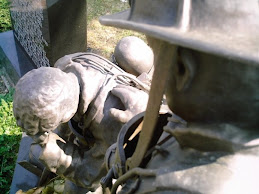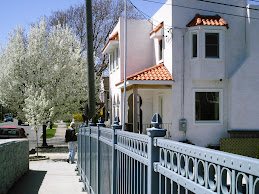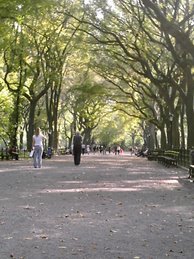By Joseph Kellard
When he was 11 and living in Pelham Bay Park, Mel Febesh would watch laborers build an extension of the Hutchinson Parkway to the Bronx-Whitestone Bridge. Febesh found himself so enthralled with this construction, that he cites it as the origin of his lifelong love of engineering, a profession the now 80-year-old Merrick man continues to pursue with no definite retirement date marked on his office calendar.
“I went there every day and watched what they did,” he recalled. “I was fascinated by the road work.”
Febesh, a licensed civil engineer in four states and co-owner of a Queens construction company, is among many seniors who opt to forgo retirement, not because they must do so to stay afloat financially, but because they’re still passionate about their professions -- and because extenuating circumstances allow them to continue on.
For 35 years Febesh has co-owned Urban Foundation/Engineering LLC in East Elmhurst. He still drives to the office by 6 a.m. and typically works to 5 or 6 p.m. each weekday, doing everything from paper work at his desk, to contract negotiations, to checking out project sites. His firm is responsible for the foundational construction at the new stadium for the New York Mets and the preparatory work at a Brooklyn LIRR railroad yard where the New Jersey Nets will build an arena.
“I just love it,” Febesh said when asked why he continues to work. “I find it challenging … You have to use your brains, and half my friends who are retired don’t have to use their brains at all.”
Teddi, Febesh’s wife of 51 years, confirmed her husband’s reasoning. “He just loves what he’s doing,” she said.
Like Febesh, Maria Frangella, a 60-something director of the Oceanside-Island Park Senior Center, and Bob Phillips, 74, a plumbing contractor for 50-plus years, trace their interests in their professions to their childhoods.
Frangella’s 30-year career assisting seniors in many areas of their lives stems from her teenage years when she used to help out her Italian immigrant parents -- her father was a chef and contractor and her mother a housewife -- with anything from going to the water or tax departments to work out their finances, or dealing with problems with tenants who rented from them in their Park Slope brownstone.
“I’ve always enjoyed helping people out,” said the Island Park woman, who conducts a variety of programs, including arts and crafts, dance exercises, Bingo and Tai Chi, for the some 75 to 100 seniors attending the center at St. Anthony’s Church in Oceanside each weekday.
When Phillips was about 13, he worked with his father in his plumbing business each day after school in East New York. He found he liked working with his hands and, instead of inheriting his father’s business, he started and built his own, one that is still going strong after five decades. “The bottom line is, I enjoy what I’m doing, it keeps me mentally young and healthy, and I’m not the type of fella who likes to sit and watch TV all day and just veg away,” Phillips said.
The Merrick man and his assistant do mostly minor plumbing repairs at an average of 50 to 75 homes along the South Shore each week. While normal hours are between 8 to 5, Phillips is on call 24 hours, and about twice a week he’ll go out on emergency calls in the wee hours of the morning.
According to a 2005 survey of the U.S. Census Bureau, of the 90,991 seniors in Nassau County who are 65 to 74, 26.5 percent are employed, and of the 97,518 of seniors 75 and over, 9.2 percent still work.
While Febesh, Frangella and Phillips all attribute their professional longevity to their love of their professions, other circumstances, such as being in general good health and the assistance of others, have contributed to their decisions to remain gainfully employed.
“I’m very fortunate that I’m in good shape,” Febesh said. “That’s part of the reason I’m able to do it.”
Saying he feels like he’s 34, Phillips also points to his wife of 52-years, Adele, who runs the financial side of his contracting business, as a fundamental factor to why he keeps plumbing. “My wife and I get along fine in the business together, and she’ll encourage me to do things,” he said. “She’s been my backbone.”
Frangella said that while she has never made much money as a social worker, and does it because she loves the work, she also notes that her financial crutch was her husband Alan, to whom she was married for 47 years before he died three years ago. For decades he’d made a comfortable living as a communications consultant with New York Telephone Company.
He was able and willing to retire at age 56. And Frangella found that he loved retirement, in large part because he kept himself busy with many hobbies: gardening, cooking, entertaining guests and computing. Except for cooking, reading and painting, Frangella said her hobbies are limited; plus she still feels challenged in her job.
Frangella flirted with retirement almost three years ago, when financial circumstances forced Catholic Charities to close down the senior center at the American Legion in Island Park, which she ran for 25 years, and merged it with the senior center at St. Anthony’s Church in Oceanside. “I thought about retiring then,” she said. “But I said, ‘Let me take up this challenge, and as soon as I can see I can succeed there, then maybe I’ll retire.’”
Phillips said the thought of retirement does occasionally cross his mind -- but only occasionally. “I like to travel, and to do more of it would be one of the main reasons to retire,” he said. While he has no particular hobbies, Phillips likes working with his hands and is tempted to tap his artistic side and take up sculpture, one of his wife’s favorite pastimes.
Febesh, too, said he has few pastimes. Unlike his friends, he doesn’t golf, play tennis, paint or gamble. He and his wife own a home in Florida, and he likes to travel and read good mysteries and political non-fiction, but that’s about it. He’d still rather work.
“That’s my problem,” Febesh said. “I’d be afraid to retire.”
“Every year, he always says maybe he’ll retire in two years,” his wife, Teddi, said, “but he’s been saying that for 10 years now.”
When will he know it’s time to call it a career? “When I get in a physical condition where I can’t do it anymore, or I unfortunately get sick,” Febesh said.
He said one of his friends’ main complaints is that many of them are sorry they retired, because they are still healthy and have to keep doing something, and sometimes their hobbies just aren’t enough to stay busy.
As one who works and gets to know intimately many seniors firsthand, Frangella says that some of them regret that they retired too early, while others were happy to retire when they did. She knows some seniors who did work into their 70s, one of whom was employed at a computer engineering company and wanted to continue to work, but was compelled to leave at 72 when her husband grew ill.
Today, when people ask Frangella why she doesn’t retire, to travel more or spend more time with her grandchildren, she says she does consider this a lot. “But you know what,” she concluded, “you want to live your life the way you are happiest. I mean, if you’re happy working, why can’t you work until the very end, as long as you can do a good job?”
Bessie Horton of Roosevelt, the kitchen supervisor at the senior center and a colleague of Frangella for 30 years, said about her director’s devotion to her work: “She’s very loyal to the seniors she works with and she loves her work. If she didn’t, I think she would have retired a long time ago.”
In the end, it all comes back to a love of what they do. Febesh said he hears every day from people asking him why he hasn’t retired yet. “But I just believe,” he said, “that people should do what they feel comfortable with.”
Please post a comment about this article. For private comments, email Joseph Kellard at Theainet1@optonline.net.
Copyright © 2007 Joseph Kellard
Wednesday, September 19, 2007
Subscribe to:
Post Comments (Atom)































+-+June+2009.jpg)











No comments:
Post a Comment